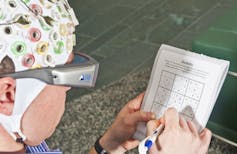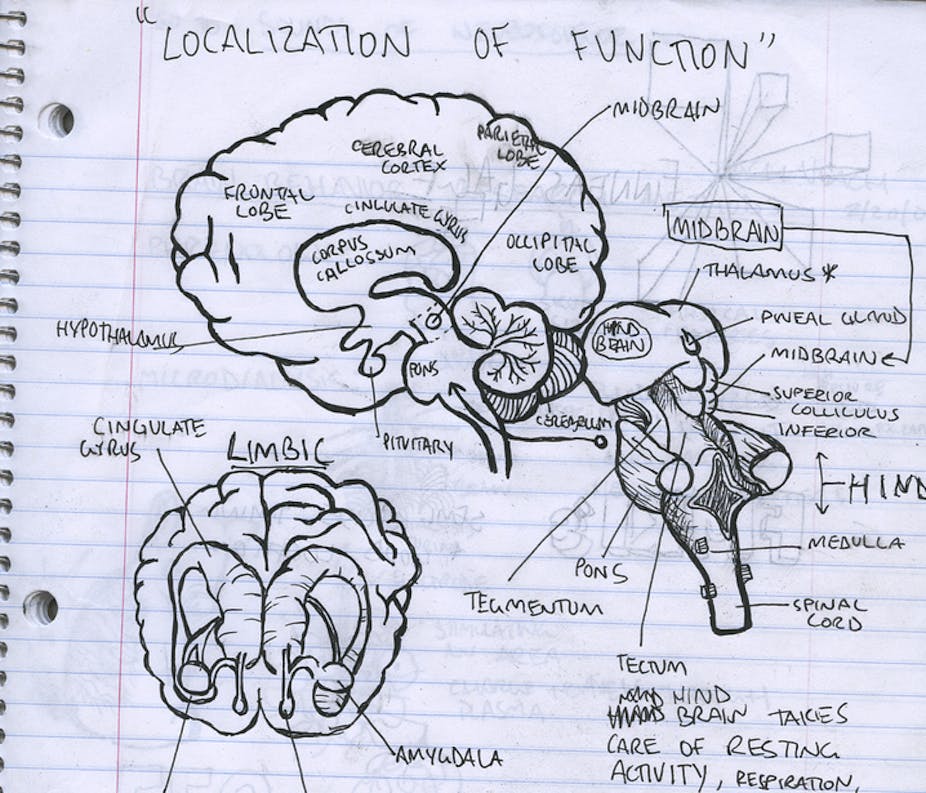People have wanted to understand our motivations, thoughts and behaviours since the ancient Greeks inscribed “know thyself” on the Temple of Apollo at Delphi. And understanding the brain’s place in health and disease is one of this century’s greatest challenges – take Alzheimer’s, dementia and depression for example.
There are many exciting contributions from neuroscience that have given insight into our thoughts and actions. Three neuroscientists have just been awarded the 2014 Nobel Prize for their discoveries of cells that act as a positioning system in the brain – in other words, the mechanism that allows us to navigate spaces using spatial information and memory at a cellular level.

There are many exciting contributions from neuroscience that have given insight into our thoughts and actions. For example, the neural basis of how we make fast and slow decisions and decision-making under conditions of uncertainty. There is also an understanding how the brain is affected by stress and how these stresses might switch our brains into habit mode, for example operating on “automatic pilot” and forgetting to carry out planned tasks, or the opposite goal-directed system, which would see you going out of your usual routine, for example, popping into a different supermarket to get special ingredients for a recipe.
Disruption in the balance between the two is evident in neuro-psychiatric disorders, such as obsessive compulsive disorder, and recent evidence suggests that lower grey matter volumes in the brain can bias towards habit formation. Neuroscience is also demonstrating commonalities in disorders of compulsivity, methamphetamine abuse and obese subjects with eating disorders.
Neuroscience can challenge previously accepted views. For example, major abnormalities in dopamine function were thought the main cause of adult attention deficit hyperactivity disorder (ADHD). However, recent work suggests that the main cause of the disorder may instead be associated with structural differences in grey matter in the brain.
What neuroscience has made evidently clear is that changes in the brain cause changes in your thinking and actions, but the relationship is two-way. Environmental stressors, including psychological and substance abuse, can also change the brain. We also now know our brains continue developing into late adolescence or early young adulthood, it is not surprising that these environmental influences are particularly potent in a number of disorders during childhood and adolescence including autism.

Though critical, there is much interest in understanding resilience and mental well-being, for example people who develop post-traumatic stress disorders. Furthermore, knowing the action of drug treatments and psychological therapies and other treatments, such as mindfulness, will allow us to develop novel and more effective treatments for those who do not respond to the currently available ones. Understanding how environment can enrich the brain is also vital.
There really is an explosion of neuroscientific techniques that will help us with these and other important challenges in understanding our brains and what makes us who we are. At the forefront will be the new researchers coming up the ranks. Here are just five who were involved in the Human Brain Project school and what they think will have the biggest impact in the field:
Andrea Santuy
The detail with which the brain will be described will allow us to identify the causes of some of the most disabling brain diseases and therefore treatments to improve the quality of life of patients, along with millions in savings for the state. Knowledge of the brain’s neural connectivity will also be a huge advance for computational science as it will foster the development of hardware and software that emulates the brain; highly integrated and energy efficient. So neuroscience will not just improve our health but also generate new, faster and more efficient technologies.
Francesco Cavarretta
The brain is life. All sensory signals, such as vision, hearing, taste and smell, pass through the brain and through nerves, where each one becomes an action. Although this may appear really mysterious, this is the only way to make any sense and reason and this will be at the forefront of study. For example, CA1, which is part of the hippocampus, identifies all the input and output signals in order to recognise any type of information; the substantia nigra is linked with pleasure sensations; and the amygdala with our emotions.
Diana Furcila
Neuroscience in the future will join together findings about how the human brain works at all its levels and of human behaviour. We should expect – and believe – that we can get proper treatment for all psycho-pathological and biological problems, such as neuro-degenerative diseases like Alzheimer’s for every single individual brain according to someone’s personal history. There is a time for everything and this is the moment for neuroscience – it can help us to exceed what we currently consider the limits of knowledge.
Léon Homeyer
Grounding mental phenomena in the activity patterns of our neural network will give us with a deeper understanding of human cognition and psychology. There have already been studies to predict criminality, for example which criminals might re-offend. But as with other ethical implications of future neuroscience, we can’t be naive about neuro-determinism. Severe physical impairments may deprive people from acting responsibly, but as our insights into the causal workings of the brain become more fine-grained, we might be able to explain more about what determines a person’s actions and question current notions about responsibility. Future neuroscience will contribute to a holistic understanding of human beings.
Alejandro Anton
Neuroscience will bring us a complete knowledge about the brain: how many types of nerve cells there are, in what proportion, how these different cells are regulated by their molecular machinery, as well as about their functioning in small circuits and their overall interaction in the brain as a whole. As is the case throughout the history of medicine with other physiological systems, knowledge about the brain will facilitate therapies against brain diseases.
An extensive knowledge of the human brain will also help us to answer the classic question: “who are we?” and what distinguishes us from primates. Answering the Greek challenge to “know thyself”, will be a turning point in the development of our civilization – for the first time we will achieve complete self-awareness.

